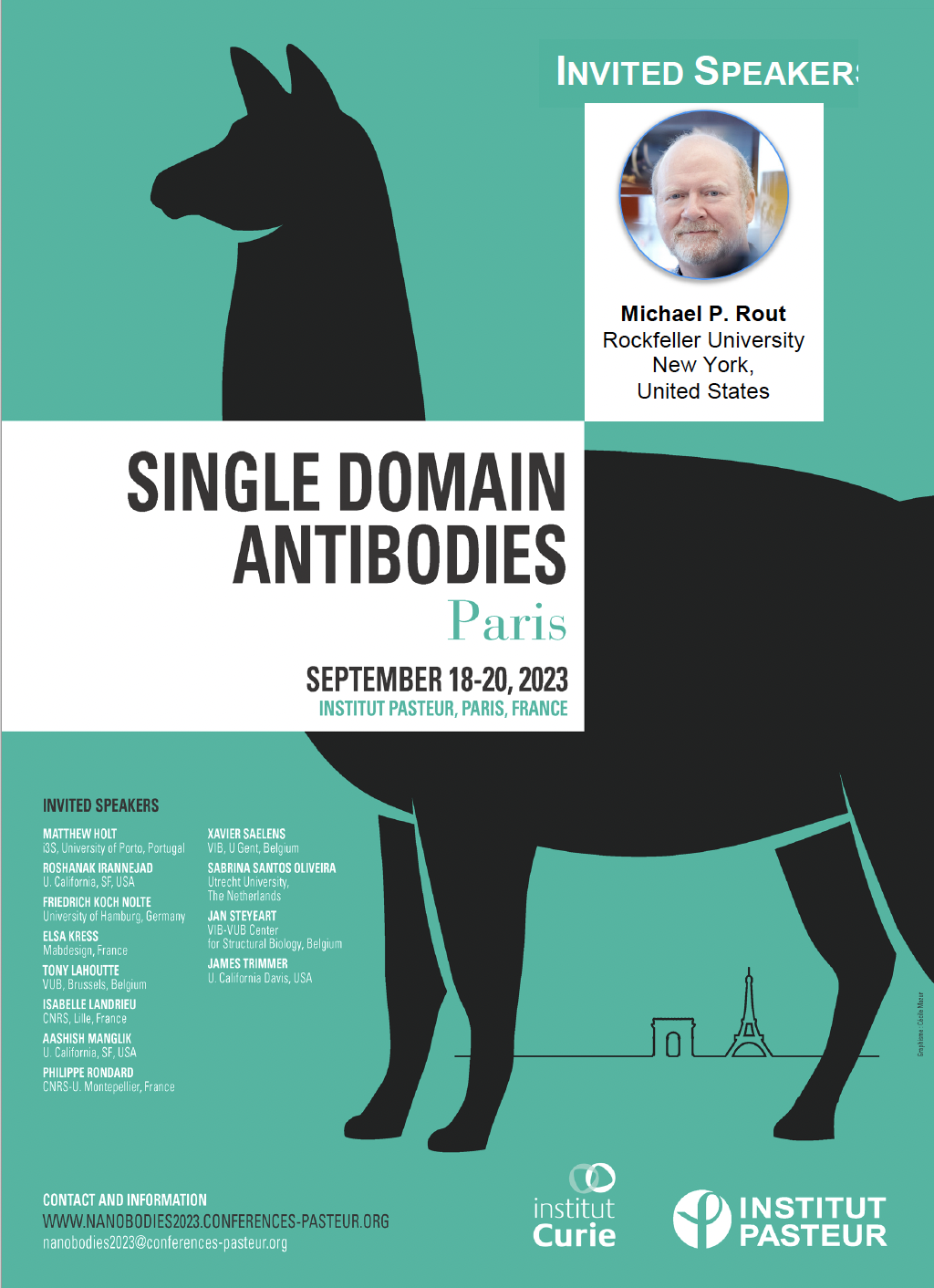
September 18, 2023
The Single-Domain Antibodies 2023 meeting was held in Paris, September 18th-20th at the Conference centre (CIS) of the Institut Pasteur. It was the 3rd congress on single-domain Antibodies after Nanobodies 2019 in Bonn and Nanobodies 2021 in Brussels. This congress allows the scientific community to meet and share the latest advances in this fast-growing scientific field.
During this meeting, NCDIR director, Professor Michael Rout was invited to give a talk on “A Pipeline for Production of Nanobody Repertoires with Diagnostic and Therapeutic Potential” at the “Single domain Antibodies in Clinics: cancer and inflammatory diseases” workshop. Here is a brief summary of his talk.
Nanobodies are small single domain antibodies derived from camelids that can be targeted with high specificity against almost any antigen. Moreover, they can be inexpensively expressed in virtually unlimited quantities in simple bacterial cultures, as well as engineered to maximize their potential – they show tremendous promise as therapeutic reagents, because of their high specificity, small size and robustness.
We developed a mass spectrometry-based technology that overcomes the limitations of some other screening methods, enabling the rapid production of large repertoires of readily expressible recombinant nanobodies against any given antigen with very high affinities and specificities. We first applied this pipeline to the production of nanobodies that recognize common protein tags such as GFP, mCherry and TdTomato, to allow ultra-rapid capture of complexes for interactomics. In studying the structures of these nanobodies we have uncovered several alternative modes of epitope recognition virtually unique to this antibody class. During the COVID-19 pandemic, having recently refined and optimized our pipeline and supplemented it with a modified yeast display screening approach, we identified classes of nanobodies that have exceptional biophysical characteristics and unique and orthogonal mechanisms for neutralizing SARS-CoV-2, and that maintain their neutralizing efficacy against current variants; we are expanding this repertoire to generate nanobody formulations that will be able to neutralize any future betacoronaviral threats. We have also discovered strong synergistic effects between nanobodies, greatly enhancing their potency when used in combination. We are now using our pipeline to generate repertoires of nanobodies against other targets of biomedical importance, enabling use in CAR-T therapeutics, treatment or diagnosis of several cancer types, and various infectious diseases.
Publications related to Prof. Rout’s talk:
Ketaren NE, Mast FD, Fridy PC, Olivier JP, Sanyal T, Sali A, Chait BT, Rout MP, Aitchison JD. “Nanobody repertoire generated against the spike protein of ancestral SARS-CoV-2 remains efficacious against the rapidly evolving virus.” bioRxiv. 2023 Jul 14:2023.07.14.549041. doi: 10.1101/2023.07.14.549041. Preprint. PMC10369967
Cross FR, Fridy P, Ketaren N, Mast F, Li S, Olivier P, Pecani K, Chait BT, Aitchison JD, Rout MP. “Expanding and Improving Nanobody Repertoires Using a Yeast Display Method: Targeting SARS-CoV-2”. J Biol Chem. 2023 Jan 28;102954.doi: 10.1016/j.jbc.2023.102954. Epub 2023 Jan 28. PMC9884143
Mast FD, Fridy PC, Ketaren NE, Wang J, Jacobs EY, Olivier JP, Sanyal T, Molloy KR, Schmidt F, Rutkowska M, Weisblum Y, Rich LM, Vanderwall ER, Dambrauskas N, Vigdorovich V, Keegan S, Jiler JB, Stein ME, Olinares PDB, Herlands L, Hatziioannou T, Sather DN, Debley JS, Fenyö D, Sali A, Bieniasz PD, Aitchison JD, Chait BT, Rout MP. “Highly synergistic combinations of nanobodies that target SARS-CoV-2 and are resistant to escape.” Elife. 2021 Dec 7;10:e73027. doi: 10.7554/eLife.73027. PMC8651292
Fridy PC, Li Y, Keegan S, Thompson MK, Nudelman I, Scheid JF, Oeffinger M, Nussenzweig MC, Fenyö D, Chait BT, and Rout MP. “A robust pipeline for rapid production of versatile nanobody repertoires.” Nature Methods. 2014 Dec;11(12):1253-60. doi: 10.1038/nmeth.3170. Epub 2014 Nov 2. PMC4272012
